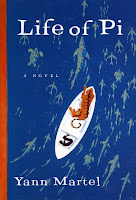The Great Gatsby - F. Scott Fitzgerald
It seems to me that of late, it has
become fashionable amongst the 'literati' to turn up their noses at
F. Scott Fitzgerald's 'The Great Gatsby'. At least, amongst my friends
studying English at university, a certain disdain for the novel
has been more confidently voiced since Baz Lurhmann's film brought
the novel to an even wider audience. As the public jumped eagerly
onto the Gatsby bandwagon, my friends jumped off – and the novel
that had been claimed as the favourite book of A-Level English
students everywhere lost favour. The fashion magazines
admittedly sort of missed the point, revelling in the excesses of the
film which inspired Prada's extortionately expensive 'golden,
crystal-laden' party gowns. Whether Fitzgerald would quite have been turning in his
grave is up for debate, as the author was admittedly, like his
narrator Nick, as much 'enchanted' as he was supposedly 'repelled by
the inexhaustible variety of life' in The Jazz Age.
This is a kind of manifesto in support of 'The Great Gatsby'. Possibly not Fitzgerald's most refined work (contemporary critics described him as a "a
wild child dashing aimlessly about his nursery, smashing toys and
breaking windows") - but I like it for all its sentences dripping with description, Fitzgerald's famous lists overspilling each line with the burden of their excess, and for the obvious joy in each line as Fitzgerald wrote what he called 'the best American novel ever written' in a fabulously self-congratulatory way.
'The Great Gatsby' tends to read like a 300 page long quote, with turns of phrases that sit so well on the tongue that you can almost taste them: bitter when Gatsby realises what "a grotesque thing a rose is and how raw the sunlight was upon the scarcely created grass", or too sweet when, before kissing the girl of his dreams, he pauses to listen to the 'tuning fork that had been struck upon a star'. It's sad, especially when the reader begins to realise that the naïve and wildly mislead Gatsby, will not, like an overexcited puppy, let go of the rags of his dream.
If you can stomach an artificial world "redolent of orchids and pleasant, cheerful snobbery and orchestras which set the rhythm of the year, summing up the sadness and suggestiveness of life in new tunes" then dive in - but Fitzgerald's lyrical prose is not for everyone. As for me, I'll be joining the hundreds who come and 'twinkle hilariously' on Gatsby's lawn :)
'The Great Gatsby' tends to read like a 300 page long quote, with turns of phrases that sit so well on the tongue that you can almost taste them: bitter when Gatsby realises what "a grotesque thing a rose is and how raw the sunlight was upon the scarcely created grass", or too sweet when, before kissing the girl of his dreams, he pauses to listen to the 'tuning fork that had been struck upon a star'. It's sad, especially when the reader begins to realise that the naïve and wildly mislead Gatsby, will not, like an overexcited puppy, let go of the rags of his dream.
My Verdict: I really like it - despite the rolling eyes I'll get from book snobs!













